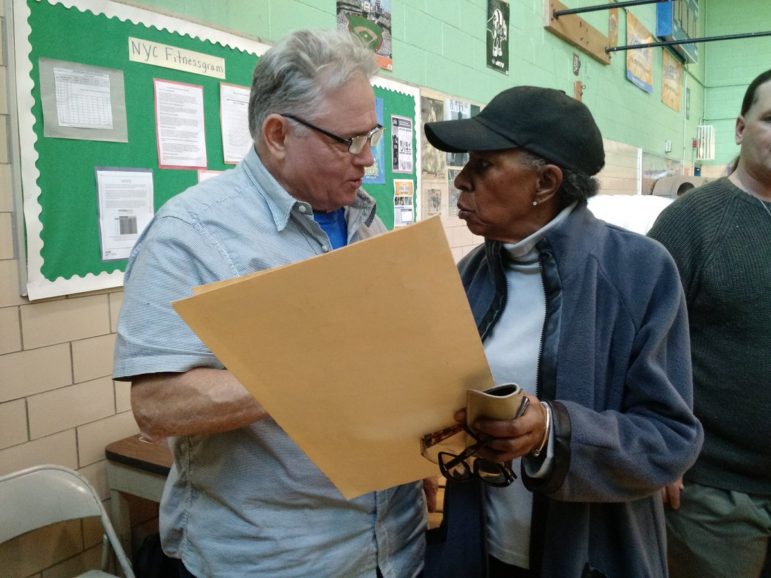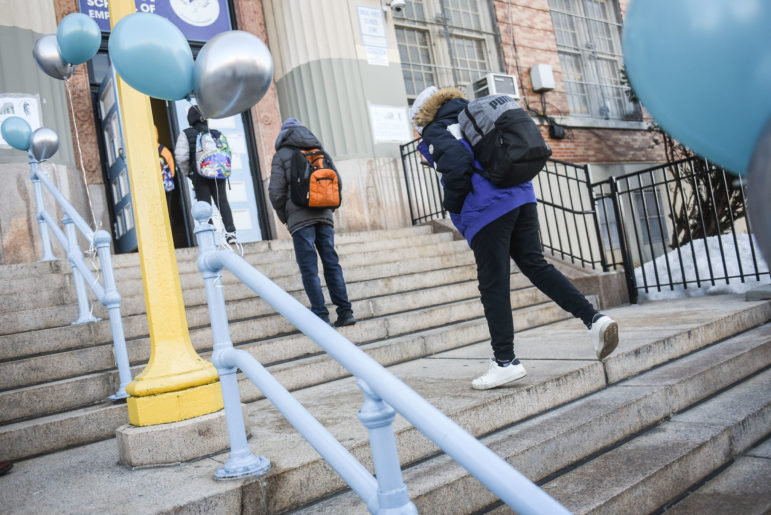
Kerr/Sheppard
Voters approached Humphrey Ortiz, 63, the polling place coordinator at P.S. 8 Isaac Varian with a constant stream of questions about their ballots, including how to vote for their candidates, how to change their name on their voter registration, how to scan their ballots and more.
The largely thankless task of a polling place coordinator is always different, from election to election, from voting station to voting station. But in some ways the jobs are always the same: helping people commit democracy.
In Bedford Park on Tuesday, Humphrey Ortiz, 63, the polling place coordinator at P.S. 8 Isaac Varian, paced around the mint green gymnasium, taking question after question from person after person.
Voters approached Ortiz with a constant stream of questions about their ballots, including how to vote for their candidates, how to change their name on their voter registration, how to scan their ballots and more.
Ballot scanning machines and Ballot Marking Devices (BMDs), which are used by voters with vision and hearing impairments, malfunctioned. Other poll workers kept Ortiz updated on the status of the machines. Ortiz said he had been trying all day to telephone the Board of Elections to get them fixed.
“Busy, busy, busy,” he said. “And then they put you on hold.”
A couple of repair people finally came, he said, but were unable to fix the problems.
At Manhattan College, Maria Carver, 53, was working as a polling place coordinator only because her sister signed on to do it but then couldn’t. Carver, who is on disability and no longer works, was excited to take on the opportunity.
“Before I go, I want to do something for my country,” she said. “I feel better that I’ve done something for the movement.”
Carver delegated tasks to poll workers, set up signs and made sure the site was accessible to people with disabilities. She said it’s important as a citizen to be engaged, even for those who chose not to vote this election.
“A lot of people are not voting,” she said. “Some were swayed by the news, the bickering between candidates. Where’s the talk about the issues?”
Carver, an African-American woman, said other black women she knew were not as motivated to vote as when Obama ran in 2008 and 2012.
“It disturbed me,” she said. “It’s not a one-time deal type of thing. You have to continue to vote.”
Meanwhile back in Bedford Park, Humphrey Ortiz said the turnout through most of the day was good compared to previous elections.
“This year and the Obama’s election were both real busy,” said Ortiz, who has been a polling place coordinator for over 20 years.
Ortiz had been up since 3 a.m. He said he likes to get up extra early on election day so he can take his time and prepare for early morning voters.
“At 6 a.m. people rushed in like a stampede of horses,” Ortiz said.
After the first early rush and a second at 11 a.m., Ortiz said he was bracing himself for the after-work rush.
“After work, forget it,” he said, throwing his arms up in the air and turning to answer the next voter’s question.
City Limits is partnering with the CUNY Graduate School of Journalism on covering Election 2016 in the Bronx.








